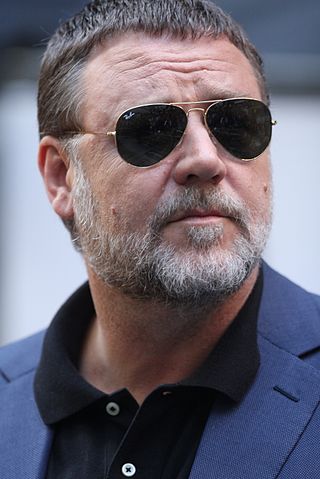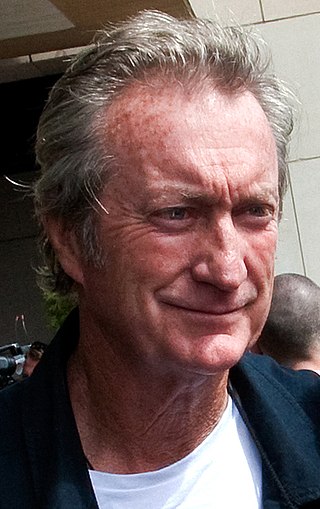
Russell Ira Crowe is an New Zealand-born actor, director and musician. He was born in Wellington, spending 10 years of his childhood in Australia and residing there permanently by age 21. His work on screen has earned him various accolades, including an Academy Award, two Golden Globe Awards, and a British Academy Film Award.

Mel Columcille Gerard Gibson is an American actor and film director. He is known for his action hero roles, particularly his breakout role as Max Rockatansky in the first three films of the post-apocalyptic action series Mad Max and as Martin Riggs in the buddy cop action-comedy film series Lethal Weapon.

Peter Lindsay Weir is an Australian retired film director. He is known for directing films crossing various genres over forty years with films such as Picnic at Hanging Rock (1975), Gallipoli (1981), The Year of Living Dangerously (1982), Witness (1985), Dead Poets Society (1989), Fearless (1993), The Truman Show (1998), Master and Commander: The Far Side of the World (2003), and The Way Back (2010). He has received six Academy Award nominations, ultimately being awarded the Academy Honorary Award in 2022 for his lifetime achievement career.
The year 1999 in film included Stanley Kubrick's final film Eyes Wide Shut, Pedro Almodóvar's first Oscar-winning film All About My Mother, the science-fiction film The Matrix, the animated works The Iron Giant, Toy Story 2, Tarzan, and South Park: Bigger, Longer & Uncut, the Best Picture-winner American Beauty, and the well-received The Green Mile. Other noteworthy releases include M. Night Shyamalan's The Sixth Sense, David Fincher's Fight Club, Sofia Coppola's The Virgin Suicides and Paul Thomas Anderson's Magnolia. The year also featured George Lucas' top-grossing Star Wars: Episode I – The Phantom Menace. Columbia Pictures and Metro-Goldwyn-Mayer celebrated their 75th anniversaries in 1999.

Judith Davis is an Australian actress. In a career spanning over four decades of both screen and stage, she has been commended for her versatility and regarded as one of the finest actresses of her generation. Frequent collaborator Woody Allen described her as "one of the most exciting actresses in the world". Davis has received numerous accolades, including nine AACTA Awards, three Primetime Emmy Awards, two British Academy Film Awards, and two Golden Globe Awards, in addition to nominations for two Academy Awards.

Bruce Beresford is an Australian film director, opera director, screenwriter, and producer. He began his career during the Australian New Wave, and has made more than 30 feature films over a 50-year career, both locally and internationally in the United States. He is a two-time Academy Award nominee, and a four-time AACTA/AFI Awards winner out of 10 total nominations

Bryan Neathway Brown AM is an Australian actor. He has performed in over eighty film and television projects since the late 1970s, both in his native Australia and abroad. Notable films include Breaker Morant (1980), Give My Regards to Broad Street (1984), F/X (1986), Tai-Pan (1986), Cocktail (1988), Gorillas in the Mist (1988), F/X2 (1991), Along Came Polly (2004), Australia (2008), Kill Me Three Times (2014) and Gods of Egypt (2016). He was nominated for a Golden Globe Award and an Emmy Award for his performance in the television miniseries The Thorn Birds (1983).
Disney Studios Australia is a motion picture and television production facility in Sydney that has operated as part of The Walt Disney Company since 2019.

Phillip Noyce is an Australian film and television director. Since 1977, he has directed over 19 feature films in various genres, including historical drama ; thrillers ; and action films. He has also directed the Jack Ryan adaptations Patriot Games (1992) and Clear and Present Danger (1994), as well as the 2014 adaptation of Lois Lowry's The Giver.
The AACTA Award for Best Film is an award presented by the Australian Academy of Cinema and Television Arts (AACTA) at the annual AACTA Awards, which hand out accolades for achievements in feature film, television, documentaries, and short films. The inaugural award was presented in 1969 by the Australian Film Institute, becoming a competitive award in 1976. Since 2011 it has awarded by the Academy, established by the AFI in 2010.
The AACTA Award for Best Actress in a Leading Role is an award presented by the Australian Academy of Cinema and Television Arts (AACTA), a non-profit organisation whose aim is to "identify, award, promote, and celebrate Australia's greatest achievements in film and television".

Icon Productions is an Australian-American production company founded in August 1989 by actor/director Mel Gibson and Australian producing partner Bruce Davey, which, unlike most other independent production companies, funds most of its development and production costs, allowing it to retain creative control of its projects. Its headquarters are in Santa Monica, California.

The National Film and Sound Archive of Australia (NFSA), known as ScreenSound Australia from 1999 to 2004, is Australia's audiovisual archive, responsible for developing, preserving, maintaining, promoting, and providing access to a national collection of film, television, sound, radio, video games, new media, and related documents and artefacts. The collection ranges from works created in the late nineteenth century when the recorded sound and film industries were in their infancy, to those made in the present day.
The AACTA Award for Best Young Actor is an award presented by the Australian Academy of Cinema and Television Arts (AACTA), a non-profit organisation whose aim is to "identify, award, promote and celebrate Australia's greatest achievements in film and television." The award is presented at the annual AACTA Awards, which hand out accolades for achievements in feature film, television, documentaries and short films. From 1991 to 2010, the category was presented by the Australian Film Institute (AFI), the Academy's parent organisation, at the annual Australian Film Institute Awards. When the AFI launched the Academy in 2011, it changed the annual ceremony to the AACTA Awards, with the current award being a continuum of the AFI Young Actors Award.
The AACTA Award for Best Original Screenplay is an award presented by the Australian Academy of Cinema and Television Arts (AACTA), for an Australian screenplay "written directly and originally for the screen". Prior to the establishment of the Academy in 2011, the award was presented by the Australian Film Institute (AFI) at the annual Australian Film Institute Awards. It was first handed out in 1978 when the award for Best Screenplay was split into two categories: Best Original Screenplay and Best Adapted Screenplay. The award has since been presented intermittently from 1978-1979, 1983-1987, 1989, 1993-2006, and then from 2008-present.
The Australian Film Institute Award for Best Foreign Film was an award presented by the Australian Film Institute (AFI), for a film made outside of Australia in English or non-English language. It was handed out at the Australian Film Institute Awards, which are now the AACTA Awards after the establishment of the Australian Academy of Cinema and Television Arts (AACTA), by the AFI. The Award was handed out from 1992–2004.
The AACTA Award for Best Adapted Screenplay is an award presented by the Australian Academy of Cinema and Television Arts (AACTA), for an Australian screenplay "based on material previously released or published". Prior to the establishment of the Academy in 2011, the award was presented by the Australian Film Institute (AFI) at the annual Australian Film Institute Awards. It was first handed out in 1978 when the award for Best Screenplay was split into two categories: Best Original Screenplay and Best Adapted Screenplay. The award has since been presented intermittently from 1978–1979, 1983–1987, 1989, 1993–2003, 2005–2006, and then from 2008–present.
The 41st Australian Film Institute Awards were held on 13 November 1999. Presented by the Australian Film Institute (AFI), the awards celebrated the best in Australian feature film, documentary, short film and television productions of 1999. The nominations were announced on 13 October 1999. Two Hands received the most nominations in the feature film category with eleven, while SeaChange received seven nominations in the television category.









